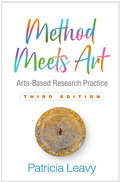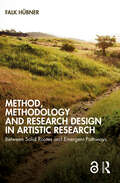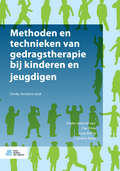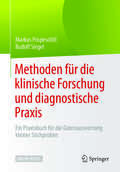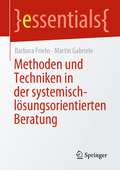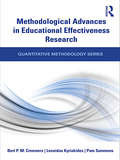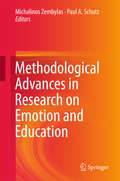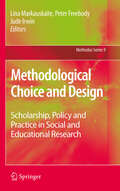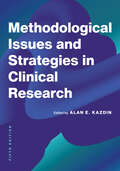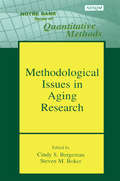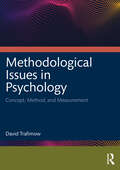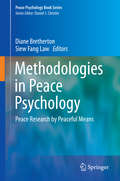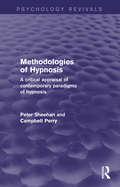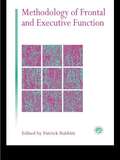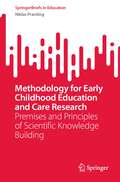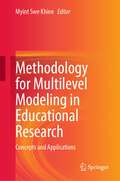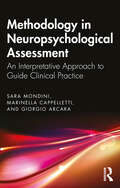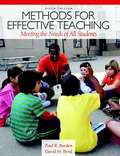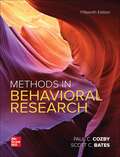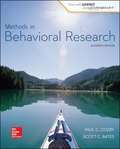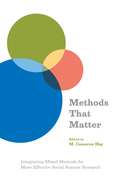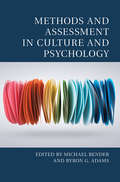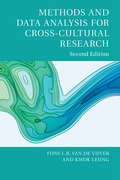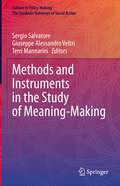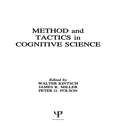- Table View
- List View
Method Meets Art, Third Edition: Arts-Based Research Practice
by Patricia LeavyIdeal for courses in multiple disciplines, the third edition of this award-winning text has been revised and updated with new topics, examples, and guiding questions to introduce each chapter&’s sections. Patricia Leavy presents a practical guide to the full range of arts-based research (ABR) genres--narrative inquiry, fiction-based research, poetry, music, dance, theatre, film, and visual art. Each genre-specific chapter is paired with an exemplary research article or online video link (at the companion website). Following a consistent format, chapters review how the technique was developed, explore its methodological variations and the kind of research questions it can address, and describe diverse sample studies. Checklists and practical advice help readers harness the power of these innovative techniques for their own studies or dissertations. New to This Edition *Covers additional ABR practices: concrete research poetry, musically enhanced narrative inquiry, community music projects, musical spoken word, scored transcripts, comics/graphic novels, wordless narrative research, and installation art. *Discussions of research design, collaborative ABR, and ways to overcome common ABR challenges, plus tips for getting started. *Numerous new research examples, including three new end-of-chapter exemplars. *Increased attention to the impact of research, with a heightened focus on ethics, public scholarship, and issues of audience. Pedagogical Features *Checklists of issues to consider when deciding how to use a particular method. *Discussion questions and activities for in-class use or assignment. *Annotated lists of suggested readings and websites, including links to online performance pieces. *Compelling research examples from multiple disciplines. *Chapters follow a consistent format and can be read independently or in sequence; new guiding questions introduce sections within chapters.
Method, Methodology and Research Design in Artistic Research: Between Solid Routes and Emergent Pathways
by Falk HübnerMethod, Methodology and Research Design in Artistic Research: Between Solid Routes and Emergent Pathways offers a rich and innovative approach to method, research design and methodology of research in and through the arts. It spans the process from initial research design, ongoing and continuous decisions that need to be made while designing and carrying out research up to the analysis and reflection on this process when finished.Drawing on a huge body of experience, examples of renowned artist-researchers in the international field, as well as on contemporary posthumanist philosophy and methodological literature in the humanities and social sciences in particular, the conceptual core of the book is the author's Common Ground model for research design: Hübner suggests a flexible approach both for the overall research design as well as for the from-scratch design of distinct methods. This means in particular to provide space for the unknown, and for the occasional messiness of research in and through the arts; the book provides a thorough exploration of the emergent aspects and unforeseen paths that come up during a research trajectory.Transdisciplinary in scope, this is not just a book "about", but "to work with" methodology, supporting both seasoned and early career researchers, as well as supervisors in graduate, post graduate and doctoral education contexts.
Methoden en technieken van gedragstherapie bij kinderen en jeugdigen
by Pier Prins Caroline Braet Joop BoschDit boek geeft een geactualiseerd overzicht van de belangrijkste methoden en technieken op het gebied van de gedragstherapie voor kinderen en jeugdigen. De gedragstherapie wordt theoretisch helder ingekaderd, systematisch beschreven en geïllustreerd met casuïstiek van uiteenlopende emotionele en gedragsproblemen. Ook het modulaire werken dat protocolmatige en gepersonaliseerde behandeling integreert, krijgt ruime aandacht. Daarnaast worden de nieuwste ontwikkelingen in de cognitieve gedragstherapie bij kinderen en jeugdigen beschreven en onderbouwd met recent onderzoek. Deze 3e herziene uitgave bevat tevens een geheel nieuw hoofdstuk over non-specifieke therapeutische factoren. Dit boek is bedoeld voor GZ-psychologen, orthopedagogen en klinisch psychologen. Zowel voor de academische opleidingen en hogere beroepsopleidingen als voor diverse nascholingstrajecten biedt dit boek een schat aan informatie. Anders dan bij andere boeken op het terrein van de psychotherapie bij kinderen en jeugdigen, is dit boek ook waardevol voor professionals die hun behandeltechnieken willen updaten en bijschaven. Alle auteurs zijn werkzaam in de praktijk of als docent verbonden aan een onderwijsinstelling. Prof. dr. Pier Prins is gedragstherapeut en emeritus hoogleraar klinische kinder- en jeugdpsychologie aan de Universiteit van Amsterdam. Dr. Joop Bosch was als docent en gedragstherapeut verbonden aan de afdeling Klinische Ontwikkelingspsychologie van de Vrije Universiteit Amsterdam. Prof. dr. Caroline Braet is klinisch psycholoog en gedragstherapeut en is hoogleraar aan de Universiteit Gent.
Methoden für die klinische Forschung und diagnostische Praxis
by Markus Pospeschill Rudolf SiegelDieses Buch richtet sich an im Beruf tätige Kliniker, Therapeuten und Diagnostiker, Studierende in den empirischen Humanwissenschaften, sowie an Doktoranden der Psychologie und Medizin. Es beschreibt und demonstriert: visuelle, deskriptive und inferenzstatistische Prüfverfahren der nicht-parametrischen Statistiksog. Permutations- und Randomisierungstests, die sich vor allem bei Untersuchungen an kleinen Personenstichproben oder Einzelfällen zur Analyse empirischer Daten anwenden lassenAuswertungsmethoden der psychometrischen Einzelfalldiagnostik und zur Analyse von Testprofilen gezeigt, die einen Rückschluss von Testdaten eines Einzelfalls im Vergleich zu Normdaten erlaubenVerfahren, mit denen sich Signifikanzaussagen aus einzelnen statistischen Analysen zu einer Gesamtaussage verknüpfen lassen. Für den wissenschaftlich fundierten Einsatz der Verfahren finden Sie einführend solche Untersuchungsformen und -designs, die zur validen statistischen Überprüfung von Interventionseffekten, von diagnostischen Hypothesen und von Effekten aus Einzelfallstudien geeignet sind.Als hilfreiche Besonderheit und zur praktischen Anwendung werden alle vorgestellten Methoden und Verfahren anhand konkreter Datenbeispiele in ihrer Anwendung erläutert. Die Auswertung wird mittels des Statistik-Softwarepaketes IBM SPSS Statistics und alternativ mit der freien Statistik-Software R demonstriert. Die dazu notwendigen Auswertungsskripte und Datensätze stehen für Sie als Online Zusatzmaterialien zur Verfügung. Sämtliche Skripte und Beispieldatensätze sind so beschaffen, dass sie sich mit geringem Aufwand auf Ihre eigenen Problemstellungen und Daten anwenden lassen.
Methoden und Techniken in der systemisch-lösungsorientierten Beratung (essentials)
by Barbara Friehs Martin GabrieleWas ist ein lösungsfokussiertes Kommunikationskonzept und welche Rolle spielt es in unserer Gesellschaft? Ist sie nur eine andere Form der Beratung oder doch etwas spezieller? Was machen eine gelungene Beratung und das dabei verwendete Konzept aus? Diesen und vielen anderen Fragen geht vorliegendes Buch nach. So werden auch Überlegungen zur Rolle, welche Beratung in bzw. für unsere Gesellschaft einnimmt, angestellt und besonders Techniken und Methoden der systemisch-lösungsorientierten Beratung einer genauen Betrachtung unterzogen.Zudem werden die Rolle des Beraters und der große Bereich der Kommunikation in der Beratung thematisiert.
Methodological Advances in Educational Effectiveness Research (Quantitative Methodology Series)
by Leonidas Kyriakides Pam Sammons Bert P.M. CreemersMethodological Advances in Educational Effectiveness Research is an important new work by some of the leading researchers in the field of Educational Effectiveness Research (EER). The book provides a state of the art snapshot of the methodology of EER now and clearly demonstrates the way it is applied in both research and evaluation. It shows how developments in the research methodology area such as the use of multilevel modelling approaches to analyse nested data have promoted the knowledge-base of educational effectiveness. But at the same time, as the authors show, the knowledge-base of educational effectiveness and the attempt to establish theoretical models do paradoxically challenge the development of methodologically appropriate studies including ways of analysing data. Guiding readers though the effective and appropriate use in educational effectiveness of: Longitudinal Studies Experimental Studies Mixed Research Methods Meta-analyses of effectiveness studies Using IRT to measure outcomes and factors Using Generalisability Theory to test the quality of data Multilevel modelling , and Structural Equation Modelling Techniques The authors draw in the expertise of scholars from around the world to show the mathematical background of each technique, the current and future applications, and Specific examples of applying this orientation to help the readers design their own effectiveness studies using specific methodological tools.
Methodological Advances in Research on Emotion and Education
by Michalinos Zembylas Paul A. SchutzThis volume presents different conceptual and theoreticalframeworks as well as research methods that have helped educational researchersto study emotions. It includes innovative approaches that push themethodological boundaries that have served educational researchers until nowand proposes new ways of researching emotions in educational contexts. In particular,this edited volume provides a historical frame for studying emotions. Itconnects theoretical/epistemological views with choice of research methods and describes specificmethods helpful in doing research on emotions as they are grounded in differenttheoretical and disciplinary traditions such as psychology, philosophy,sociology, history, political science, cultural studies, and feminist studies. Finally, it appreciates the contextual and international dimensions of studyingemotions in education and contributes to ongoing debates about the implicationsof our methodological choices for understanding emotion in education. Thiscombination of variety, timeliness, potential for transformation of the field,and uniqueness make this a very valuable resource to introduce new scholars inthe field alongside established scholars.
Methodological Choice and Design
by Lina Markauskaite Peter Freebody Jude IrwinBeginning and well-seasoned researchers alike face significant challenges in understanding the complexities of research designs arising from both within and across methodological paradigms, and in applying them in ways that maximise impact on knowledge, practice, and policy. This volume engages educational and social researchers in a scholarly debate offering some crucial re-interpretations of established research methodologies in light of contemporary conditions and critical introduction to some contemporary research approaches yet to gain general recognition. This book is a contemporary vademecum for researchers, practitioners and graduate students on research methodologies and designs for educational and social change in today's world. The chapters chart and analyse the conceptual and practical complexities of a variety research designs for contemporary educational and social work research. This anthology, taken overall, provides readers with the knowledge and understanding needed not only to design technically sound and coherent research studies, but also to develop methodologically innovative research projects that cross the boundaries between different methodological traditions to the benefit of scholarship, policy, and practice. The chapters cover nine research approaches: - Design-based research - Action research - Ethnomethodological research - Negotiated ethnography - Arts-informed research - Historical analysis and postcolonial scholarship - Policy analysis - Comparative research - Quantitative modelling of correlational and multi-level data The book provides a critical discussion of epistemological questions and methodological frontiers: - Knowledge and epistemology in scholarship, practice and policy - Digital knowledge and digital research - Emerging methodological challenges for educational research - Challenges and futures for social work and social policy research methods - Methodology and the knowledge industry
Methodological Issues and Strategies in Clinical Research
by Alan E. KazdinNow in its fifth edition, this classic text helps readers learn how to design, conduct, analyze, and report high-quality clinical studies. Alan E. Kazdin brings together a wide array of authoritative articles with his own expert insights to illustrate fundamental issues research in an accessible manner, including generating ideas, selecting participants, randomization, selecting assessment measures, analyzing data, and evaluating the implications of and publishing the results. New to this edition are articles emphasizing the importance of diversity in research, not only cultural diversity among study participants but also in methodology (including quantitative, qualitative, and mixed methods); the role of big data; using technology such as artificial intelligence and apps; and strategies to improve transparency and accessibility, including open science practices, replication, and preregistration. From generating hypotheses for study and selecting appropriate assessments to interpreting data and presenting findings, readers will come to better understand the whole research process as well as the importance of ethics and scientific integrity.
Methodological Issues in Aging Research (Notre Dame Series on Quantitative Methodology)
by Steven M. Boker Cindy S. BergemanMethodological Issues in Aging Research is the first volume in the "Notre Dame Series on Quantitative Methodology." This new series provides practical training on the latest quantitative methods used in social and behavioral research. Each volume features contributions from leading experts in state-of-the-art techniques applicable to a selected substantive topic.The first series volume provides researchers with innovative techniques for the collection and analyses of data focusing on aging and lifespan development. The book addresses such techniques as structural equation modeling, latent class analysis, hierarchical linear growth curve modeling, dynamical systems analysis, multivariate Rasch models, survival analysis, multilevel modeling, and quantitative genetic methods. These new techniques provide: better estimates of the direct effect of environmental or treatment effects and the dynamic pattern of genetic and environmental influences on adult development more precise predictions of outcomes which in turn increase the diagnostic power of test instruments the potential for developing new treatments that take advantage of the intrinsic dynamics of the course of a disease or age-related change to enhance treatment Methodological Issues in Aging Research appeals to advanced students and researchers in lifespan development, gerontology, health psychology, and other fields related to human development. It can be used as a main or supplemental text for advanced courses related to developmental research methods.
Methodological Issues in Psychology: Concept, Method, and Measurement
by David TrafimowMethodological Issues in Psychology is a comprehensive text that challenges current practice in the discipline and provides solutions that are more useful in contemporary research, both basic and applied. This book begins by equipping the readers with the underlying foundation pertaining to basic philosophical issues addressing theory verification or falsification, distinguishing different levels of theorizing, or hypothesizing, and the assumptions necessary to negotiate between these levels. It goes on to specifically focus on statistical and inferential hypotheses including chapters on how to dramatically improve statistical and inferential practices and how to address the replication crisis. Advances to be featured include the author's own inventions, the a priori procedure and gain-probability diagrams, and a chapter about mediation analyses, which explains why such analyses are much weaker than typically assumed. The book also provides an introductory chapter on classical measurement theory and expands to new concepts in subsequent chapters. The final measurement chapter addresses the ubiquitous problem of small effect sizes in psychology and provides recommendations that directly contradict typical thinking and teaching in psychology, but with the consequence that researchers can enjoy dramatically improved effect sizes. Methodological Issues in Psychology is an invaluable asset for students and researchers of psychology. It will also be of vital interest to social science researchers and students in areas such as management, marketing, sociology, and experimental philosophy.
Methodologies in Peace Psychology
by Diane Bretherton Siew Fang LawThis volume looks at research methods through the lens of peace studies and peace values. Apart from reviewing established methods from peace psychology, it presents some innovative ideas for conducting research in the area of peace psychology. Many of these methods are drawn from the field, from activities used by active peace practitioners. A critical component of this volume is its core argument that peace research should be conducted by peaceful means, and should model peaceful processes. Organized thematically, the volume begins with a review of the established best practices in peace psychology research methodology, including methods for qualitative research, for quantitative research, and participative action networks. In doing so, it also points to some of the limitations of working for peace within the tradition of a single discipline and to the need to expand psychology methodology, to methodologies. Therefore, the second half of the volume proceeds to explore the realm of innovative, relatively unorthodox research methods, such as participatory and workshop methods, the creative arts, and sports for research purposes. The use of new advances in information technology to conduct peaceful research are also discussed. The concluding chapters synthesize key issues from the previous chapters, and links peace psychology with ideas and implementation of research designs and practices. Finally, it discusses the nature of academic knowledge, and more specifically, academic knowledge in peace psychology, and where that fits into the mission to build a more peaceful world. Overall this book aims to provide peace psychologists with an array of possibilities and best practices for approaching their research. Many researchers find the experience of doing research a somewhat lonely, if not isolating, experience. Methodologies in Peace Psychology: Peace Research by Peaceful Means aims to alleviate this feeling as the use of these more innovative methods leads to a closer engagement with the community and a much more social experience of research. This volume is a useful tool for both new and experienced researchers because it provides leads for idealistic young researchers who want their work to make a difference, in addition to encouraging more reflection and analysis for experienced peace psychologists.
Methodologies of Hypnosis: A Critical Appraisal of Contemporary Paradigms of Hypnosis (Psychology Revivals)
by Peter W. Sheehan Campbell W. PerryOriginally published in 1976, this title looks closely at the current nature of controls in hypnosis research at the time and tries to assess what they contributed to our knowledge of hypnosis. Specifically, the book analyses the contributions to our understanding of hypnotic phenomena offered by the application of six contemporary methodologies, or paradigms, of hypnosis. The primary concern is with those paradigms that are experimental, rather than clinical, in orientation, and which had emerged over the previous decade as coherent programmatic collections of procedural strategies, all of them associated with distinct and important views of how hypnotic behaviour can best be explained.
Methodology Of Frontal And Executive Function
by Patrick RabbittThis volume reflects the pressure to develop useful models and methodologies to study executive behaviour - the ability to update information in working memory in order to control selective attention to formulate plans of action and to monitor their efficient execution. Many models are based on the concept of a single "central executive" that manges these functions; others propose a number of independent "working memory systems" that each serve one task or activity but not others.; This book is a collection of essays by active researchers who discuss their own work on the definition of "executive" or "controlled" behaviours, and on the relation of these behaviours to specific areas of the frontal cortex. The papers are particularly concerned with logical difficulties that arise in defining these functions that lead, in turn, to methodological difficulties in studying them. In particular, they discuss such problems as the low test-re-test reliability of tasks that have been used to define and explore "executive" behaviours, the limited validity of these tasks in predicting performance deficits, the poor localization of the changes observed with respect to underlying brain function, and the relation of performance on these tasks to individual difference in performance on measures of "global" or "general" intellectual ability such as Spearman's 1927 gf.; The authors discuss their own research on the relations between cognitive function and neuropsychology, on changes in executive competence in conditions such as closed head injuries or dementias that may diffusely affect the whole brain, and on changes in executive function in normal old age.
Methodology for Early Childhood Education and Care Research: Premises and Principles of Scientific Knowledge Building (SpringerBriefs in Education)
by Niklas PramlingThis book concisely explores the distinguishing features of scientific knowledge and research in early childhood education and care (ECEC). It has a dual-level focus of containing and relating the concrete practices of conducting research with the more fundamental conceptual discussions around research – the Bildung of the researcher.The book introduces and succinctly explains the concepts of methodology, theoretical knowledge about method, and how all parts of conducting research are informed by theory. The interrelation of these concepts, and many premises of research, are often regarded as assumed knowledge. In this book, premises of research are explicated and discussed, as well as methods on how to engage in informed dialogue.This introductory text explicates many features of scientific knowing and knowledge building in ECEC that tend to be presumed rather than clarified. It will be important in furthering the professional development of PhD students, Master’s students, supervisors, and researchers.
Methodology for Multilevel Modeling in Educational Research: Concepts and Applications
by Myint Swe KhineThis edited volume documents attempts to conduct systematic and prodigious research using multilevel analysis in educational settings, and present their findings and identify future research directions. It showcases the versatility of multilevel analysis, and elucidates the unique advantages in examining complex and wide-ranging educational issues. This book brings together leading experts around the world to share their works in the field, highlighting recent advances, creative and unique approaches, and innovative methods using multilevel modeling and theoretical and practical aspects of multilevel analysis in culturally and linguistically-diverse educational contexts.
Methodology in Neuropsychological Assessment: An Interpretative Approach to Guide Clinical Practice
by Sara Mondini Marinella Cappelletti Giorgio ArcaraMethodology in Neuropsychological Assessment: An Interpretative Approach to Guide Clinical Practice provides practical and methodological guidance for neuropsychologists working with people with brain lesions or brain dysfunctions. The textbook underlines the principles that can be used to guide clinicians in recognizing and interpreting signs and symptoms while enabling a complete neuropsychological assessment through a series of well-defined steps. The text provides a detailed methodological approach towards neuropsychological tools, with guidance on how to select the right test and how to interpret the outcome, which can act as a primer for a clinician through every step of the assessment in a coherent and reasoned way. The textbook presents an exhaustive discussion of the varied tools that a clinician can employ to complete a rigorous and consistent neuropsychological assessment. It guides the reader from the first step of collecting the personal history of the examinee – the anamnesis – to the selection of suitable psychometric tests and scoring, which is accordingly integrated to formulate the neuropsychological diagnosis and write up the neuropsychological report. Chapters also include coverage of the neuropsychological interview with the examinee and their family and the probability of identifying a disorder with a neuropsychological assessment. The authors have further included a series of detailed and explanatory clinical cases from their experience to expand upon the evaluation process. The textbook is valuable reading for students in clinical neuropsychology who are learning to carry out neuropsychological evaluations as well as clinicians who are seeking to develop a more comprehensive approach towards performing a thorough neuropsychological assessment.
Methods For Effective Teaching: Meeting The Needs Of All Students
by Paul R. Burden David M. ByrdThe sixth edition of Methods for Effective Teaching provides the most current research-based coverage of teaching methods for K-12 classrooms on the market today. In a straightforward, user-friendly tone, the expert author team writes to prepare current and future educators to be effective in meeting the needs of all the students they teach. In this new edition, all content is carefully aligned to professional standards, including the recently revised InTASC standards. Uniquely emphasizing today's contemporary issues, such as both teacher-centered and student-centered strategies; a myriad of ways to differentiate instruction, promote student thinking, and actively engage students in learning; approaches for teaching English language learners, and an added emphasis on culturally responsive teaching, this highly-regarded textbook is the perfect combination of sound teaching methods and cutting edge content.
Methods In Behavioral Research
by Paul C. Cozby Scott BatesMethods in Behavioral Research drives home foundational concepts and supports students’ mastery of the essential elements of behavioral research with a straightforward and accessible presentation. Fascinating and relatable research—from canonical studies to recent scholarship on Instagram usage and the impacts of Covid-19—engages students in exploring the methodology of research. Focused organization combined with clear and direct writing remains a hallmark of Methods in Behavioral Research: chapters follow the arc of a research investigation, from planning through conducting and presenting. The text provides a strong foundation for students both as future researchers themselves, and as critical consumers of global research studies and claims. The 15th edition, which aligns with APA 7e, foregrounds important questions of diversity, equity, and inclusion in past and future research and its assumed universal applicability.
Methods In Behavioral Research: (Twelfth Edition)
by Paul C. Cozby Scott C. BatesMethods in Behavioral Research continues to guide students toward success by helping them study smarter and more efficiently. In tandem with LearnSmart, McGraw-Hill Education's adaptive and personalized learning program, Cozby and Bates provide helpful pedagogy, rich examples, and a clear voice in their approach to methodological decision-making.
Methods That Matter: Integrating Mixed Methods for More Effective Social Science Research
by M. Cameron HayTo do research that really makes a difference--the authors of this book argue--social scientists need questions and methods that reflect the complexity of the world. Bringing together a consortium of voices across a variety of fields, Methods that Matter offers compelling and successful examples of mixed methods research that do just that. In case after case, the researchers here break out of the traditional methodological silos that have long separated social science disciplines in order to better describe the intricacies of our personal and social worlds. Historically, the largest division between social science methods has been that between quantitative and qualitative measures. For people trained in psychology or sociology, the bias has been toward the former, using surveys and experiments that yield readily comparable numerical results. For people trained in anthropology, it has been toward the latter, using ethnographic observations and interviews that offer richer nuances of meaning but are difficult to compare across societies. Discussing their own endeavors to combine the quantitative with the qualitative, the authors invite readers into a conversation about the best designs and practices of mixed methodologies to stimulate creative ideas and find new pathways of insight. The result is an engaging exploration of a promising new approach to the social sciences.
Methods and Assessment in Culture and Psychology (Culture and Psychology)
by Michael Bender Byron G. AdamsSignificant advancements in methodologies and statistical techniques in cross-cultural psychological research abound, but general practice, education, and most researchers in psychology rarely use them. This leads to misinterpretations, misrepresentations, and prejudice. The authors expertly demonstrate the importance of methodological rigor to safeguard appropriate inferences about similarities and differences, particularly when methods have not been developed in the cultural contexts where they are used. The book features acculturation and identity, including contributions on remote acculturation, religiosity, and organizational contexts. It also covers individual differences and evaluates methodological progress in educational assessment, emotions, motivation, and personality. Methodological and psychometric perspectives on equivalence and bias, as well as measurement invariance in cross-cultural research, are a central theme. From study design to data interpretation, it is essential for psychology, and the social sciences in general, to adopt methods and assessment procedures that are more rigorous for culture-comparative studies.
Methods and Data Analysis for Cross-Cultural Research (Culture and Psychology #116)
by Kwok Leung Fons J. van de VijverThis book gives an up-to-date overview of methodological and data-analytical issues of cross-cultural studies. Written by leading experts in the field, it presents the most important tools for doing cross-cultural research and outlines design considerations, methods, and analytical techniques that can improve ecological validity and help researchers to avoid pitfalls in cross-cultural psychology. By focusing on the relevant research questions that can be tackled with particular methods, it provides practical guidance on how to translate conceptual questions into decisions on study design and statistical techniques. Featuring examples from cognitive and educational assessment, personality, health, and intercultural communication and management, and illustrating key techniques in feature boxes, this concise and accessible guide is essential reading for researchers, graduate students, and professionals who work with culture-comparative data.
Methods and Instruments in the Study of Meaning-Making (Culture in Policy Making: The Symbolic Universes of Social Action)
by Sergio Salvatore Terri Mannarini Giuseppe Alessandro VeltriThis volume develops a theoretical framework for the modelling of meaning-making and cultural processes as crucial to the scientific study of contemporary complex societies. It focuses on the methodological and empirical aspects of the analysis of culture and its dynamics that could be applied to policymaking and to the understanding of social phenomena. It covers culture-based segmentation, ad hoc survey instruments like the VOC and PROSERV questionnaires, discourse flow analysis, the Homogenization of Classification Functions Measurement, and others. It also presents a detailed discussion of the methodology of cultural analysis in contexts of health and education. The volume showcases a top-down approach by including quantitative methods and/or automatized or semi-automatized procedures, and at the same time supports a hermeneutic, bottom-up, abductive approach, focused on the situated dynamics of meaning-making. It provides insights from cultural studies, social statistics, social policy, and research methodology in the social sciences. This is a useful resource for academics involved in studying cultural dynamics and for policy-oriented researchers and decision-makers who are interested in cultural dimensions of the design, implementation and reception of public policies.
Methods and Tactics in Cognitive Science
by James R. Miller Walter Kintsch Peter G. PolsonFirst published in 1984. The editors of this volume are three psychologists whose work has brought them into frequent contact with other disciplines within cognitive science, particularly linguistics and artificial intelligence. Cognitive science is based on the belief that crossing the boundaries of the traditional disciplines is not merely possible, but indeed essential in the study of cognition. The purpose of this volume is to facilitate this interaction among the disciplines that constitute cognitive science, and trying to do this not by an abstract discussion of methodological issues, but by concrete example.
